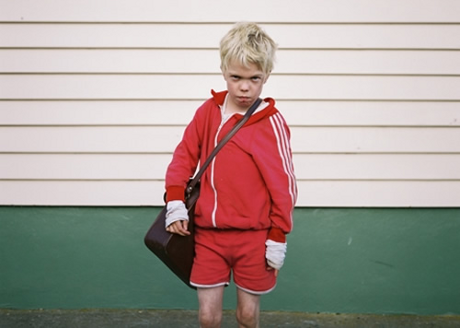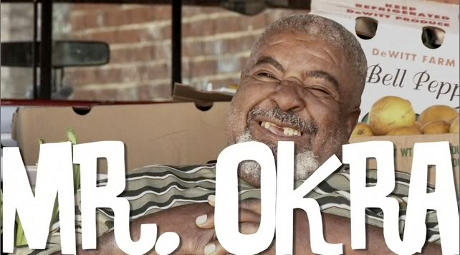Ah, the short film. Clever, punchy, witty. Get you in, make you laugh, give you some pang of emotional recognition, get you out, get on with it. Much like movie reviews, shorts don’t have the luxury of a sustained audience mentally prepared for an in-depth endeavor. By their name and nature, shorts are exactly what they promise, brief. For the most part, there just isn’t time to give a deep Bressonian gravity to whatever drama they might cook up. If watching the 2010 Sundance Film Fest’s program of shorts has taught me anything, it’s this: brevity is best served by being funny.
I’d like to push it farther and say that comedy is, at least in many ways, dramatic shorthand. That by making fun of a character, or by showing them in a unique, (but hopefully not) quirky light, a short-filmmaker can engender in 30 seconds the kind of sympathy that most dramatic films spend their first hour trying to earn. If this is true, and (excising purely formal experimental shorts) I believe it is, then any short that attempts in 15 minutes what a Bresson, a Kiarostami, or an Ozu take (in general) two-plus hours to accomplish is doomed to failure.
Of the nine 2010 Sundance shorts that I’ve been able to see, two try and fail to reach the heights of drama. Not that they shouldn’t have tried, but the other seven, which are each some combination of silly, sincere, absurd and nostalgic, are the ones that work. A few more statistics: 9 short films are featured in this program; 3 are American (though one of those is in German with subtitled English); 2 are Australian; 1 is from New Zealand; 1 is Polish; 1 is Spanish; 1 is split between the UK and the Ukraine; 8 are live action; 1 is animated; 1 is a documentary; 2 are dramas (both live-action); 7 are comedies (1 animated, 6 live-action); 2 are unsuccessful; 7 are pretty much fantastic.
There’s a direct relationship between those last four stats: 2 are dramas, and the same 2 are bad; 7 are comedies, and all 7 are worth watching. Furthermore, of the 4 shorts that I find not only funny but emotionally engaging, all are comedies. Granted, I’m making this assertion based on a selection of the 2010 Shorts Program, and (further granted) there is no way of accurately gauging whether these nine Sundance selections are in any way an objective barometer of the international short-filmmaking scene. Still, many countries are represented by Sundance 2010, and many styles are employed. It’s worth thinking over: The ones that work on any level are comedies.
Now, to the shorts. Listed in descending order of quality:
-
The Six Dollar Fifty Man (Mark Albiston/Louis Sutherland, New Zealand)

Surprisingly well-shot, crisply edited, richly colored: for a short, The Six Dollar Fifty Man looks like it had the budget of a fairly large feature. There is a real sense of space and comedic timing, which means a playful use of photography to illustrate feeling. A close-up of a retainer being pulled from a teacher’s mouth with its string of saliva still attached perfectly conveys main character Andy’s cautious loathing of the woman; no dialogue is needed. A shot of Andy jumping off a roof is followed by a shot of a doll dressed like him landing on the ground, which is itself immediately followed by Andy’s actual landing — a cinematic fake-out that presages the ending, wherein a story about a put-upon-yet-creative outsider child — being bullied and misunderstood at school — turns into a fairly uplifting picture of the boy’s creativity being nurtured. It is cleverly structured so that its surprise ending is as much a surprise for Andy as it is for us. The acting, particularly by children, is exceptional.
-
Wisdom Teeth (Don Hertzfeldt, US)
“This is a pain of unreasonable proportions,” remarks one stick figure to another as an endless line of stitching is extricated from his bloody gum lining. Dryly put and inarguably accurate, the line is delivered with an ironic degree of remove, as if the figure is watching someone else in pain, feeling simultaneously dispassionate and disturbed. Which is exactly how the audience, another step removed, is made to feel. Thus the simple, sadistic brilliance of director Don Hertzfeldt, the de facto godfather of hand-drawn comic animators like Brad Neely. Hertzfeldt’s style is simple to the point of absurdity, i.e., right where it needs to be. His work is the most precisely timed and gleefully sick comedy since the young surrealist Buñuel (Hertzfeldt is more frequently compared to David Lynch, whose sense of humor is nowhere near as salient). The stick-figure simplicity is a weapon used to disarm the viewer: you will not expect such visceral disgust to come from stick figures, nor such liveliness. This short, which is about little more than the stitch being pulled from the gums, is also inexplicably in German (I think); though I can’t exactly justify laughing at the way an entire country speaks, it makes the whole ordeal even funnier.
-
My Rabit Hoppy (Anthony Lucas, Australia)
A child’s ultra lo-fi camcorded show-and-tell video (“Rabbit’s like running fast… No digging holes, Hoppy!”) subtly morphs into the world’s most innocent monster movie, wherein children terrorized by a giant mutating rabbit can’t seem to treat the event as anything other than fodder for their class video and/or a larger amount of crap to clean out of a cage. Assured, straight-faced, hilarious.
-
My Invisible Friend (Pablo Larcuen, Spain)

A strenuously silly take on conquering loneliness that’s pretty touching, despite not being quite as funny as it might have been were it less self-aware. The titular friend is a shirtless, Star Wars-masked young man hired by a fat boy’s parents to bring the latter out of a mute funk characterized by catatonic shyness and video game addiction. The fat boy and the invisible friend bond over dancing (to 80s pop) and masturbating (to 80s workout videos). This was shot on lo-fi 16mm in drab colors; the characters are grotesques; and (possibly to the filmmakers’ credit) the Spanish suburban locale is indistinguishable from any boring American neighborhood you could think of. If you know the oeuvre of Jared and Jerusha Hess, you have some idea of the resolute strangeness and intentional illogic that this film insists on. The difference being that, when Napoleon Dynamite attempts human contact, the Hesses can only make fun of him and amp up the weirdness; but when the invisible friend and the fat boy bond, you’re pulling for them.
-
Drunk History: Douglass & Lincoln (Jeremy Konner, US)
As the presence of Will Ferrell (and two other major movie stars) will attest to, this short was made for and originally uploaded onto Funnyordie.com, the comedy website started by Ferrell and director Adam McKay. If you don’t know the website, check it out, there’s some good stuff. If you do, this plot synopsis should not seem bizarre: Jen Kirkman, a professional comedian, pours two bottles of wine down her throat and allows herself to be filmed recounting what she can recall of the historical relationship between Frederick Douglass and Abraham Lincoln. There is a reenactment, in which Douglass is played by Don Cheadle spot-on lip-miming Kirkman’s drunken words; Lincoln is Will Ferrell doing the same (and not as effortlessly funny as he’d like to think); and Mary Todd Lincoln is Zooey Deschanel, who gets the lip-miming down and is funnier than Ferrell. The actors are dressed in silly costumes, and the joke is that it might be funny to see historical figures speak like a drunk woman from the 21st century. That’s about it. This one took the Jury Prize in US Short Filmmaking, pretty much making it the Shorts winner.
-
Young Love (Ariel Kleimen, Australia)
Initially off-putting and blankly violent, Young Love turns out to be a comic parable of exactly what its title suggests. A young man stumbles through a field, clutching an open gut-wound. When he finally lays down in the grass, and just as a herd of llamas comes to watch him, his axe-wielding girlfriend pulls up on an all-terrain vehicle, nursing the unnamed grievance that led her to hack at him in the first place. We can’t understand a word she’s yelling (it sounds like some Slavic language, however subtitles are not provided), but before long she lays down with him to engage in some heavy petting. Cut to black. It’s too realistically shot for its ironic absurdity to be funny for long, but the abrupt ending is exactly what the story needed.
-
Mr. Okra (T.G. Herrington, US)

Mr. Okra is, all in all, a pleasant, sweet, extremely short documentary that carries the major distinction of being completely without conflict. The titular New Orleans vegetable seller is an obese old black man with a jolly disposition, a bayou accent (which requires that the filmmakers subtitle his every word), and a truck loaded to the gills with fresh produce that he sells for cash around the Ninth Ward. There’s not more than 10 minutes here, and it’s all Mr. Okra driving, announcing to bystanders that he is indeed loaded down with vegetables for sale, or sitting in a folding chair confessing that he was a ladies’ man in his twenties, back before New Orleans underwent its shift to servicing tourists and cleaning up after Hurricanes. It’s hard not to smile at Okra’s patois and happy-go-lucky worldview, but given that there isn’t much time to get to know Okra, and since in its form and breeziness it resembles a clippy jazz tune about an indomitable New Orleanean, Mr. Okra may have been better served if it were entirely a jazz montage of the Ninth Ward.
-
Birthday (Jennifer Malmqvist, Poland)
A lesbian throws a party for her life-partner’s birthday, the same day the latter decides to admit she has been inseminated the old-fashioned way by a male friend. Needless to say, the party can’t go on. Insemination syringes, alcohol, and the present of a homemade canoe all factor into the ensuing drama, which moves briskly through each character’s emotions, stopping briefly for some overbearing visual metaphors (the canoe adrift off a barren shore) to a tidy conclusion. The images are as artificially bright as false teeth, and though the acting is generally spot-on — believable, I mean — the overall effect is of a feature-length story ruthlessly pared down to a short. It’s hard to imagine the filmmakers having thought this story needed less fleshing out, so maybe budgetary concerns could account for its amputated brevity.
-
Rob and Valentyna in Scotland (Eric Lynne, UK)
An American male and a Ukrainian female, cousins, vacation together in Scotland. Not-so-subtle intimations are made that American Rob is suffering the forbidden attraction to Ukrainian Valentyna. When he tries to kiss her, in a moment that is awkward both for the characters and the audience (who have seen this clichéd clumsiness in thousands of sitcom episodes), things grow quiet, then tense, then fizzle out. Nothing is helped by the actor playing Rob (co-writer Rob Chester Smith) and his (most likely) intentionally flat delivery. And the dreary coziness of Scot country can’t nearly make up for this misguided attempt to convey what is probably the intense pain of familial crushes. Narrated and edited, in a nifty doubling-up trick, by master British editor Sam Sneade.
